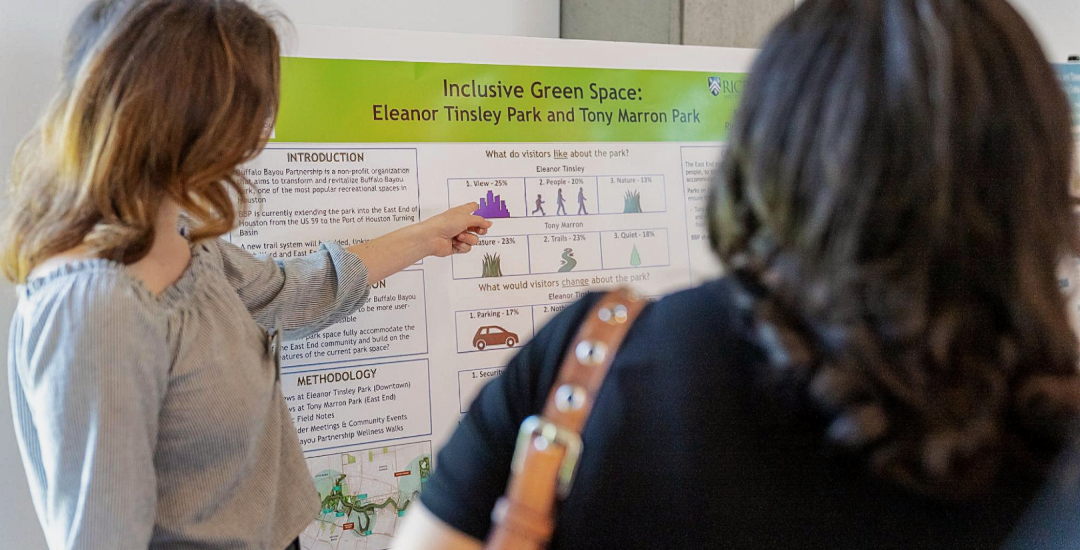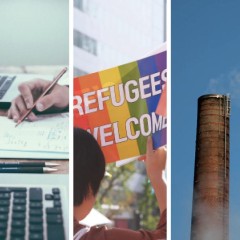Community Bridges, an experiential service learning program provided by Rice University’s Kinder Institute for Urban Research, allows fellows to simultaneously study the theories of urban sociology in the classroom and undertake internships with nonprofit partners to expand the organizations' ability to make evidence-based decisions in pursuit of their missions.
In support of our partners' efforts to promote equitable communities in Houston, the 2022-2023 Community Bridges research projects increased their internal capacity to identify communal disparities and needs and strategize solutions that reflect the interests of the communities they support.
To support Buffalo Bayou Partnership’s Buffalo Bayou East Master Plan, which aims to expand Buffalo Bayou Park trails into the East End and Fifth Ward neighborhoods, fellows Sarah Davidson (’25) and Gabriela Perez (’23) implemented a “boots on the ground” approach, conducting 77 interviews with attendees in Tony Marron Park (East End), The Water Works in Buffalo Bayou Park (Downtown) and Eleanor Tinsley Park (Downtown) and attending stakeholder and community meetings to gain perspective and gauge attitudes.
Interview responses included mentions of the parks’ maintenance, parking space availability, security, curiosity and excitement about the expansion and descriptions of the parks’ ambiance, such as Eleanor Tinsley’s “lively, urban feel” and Tony Marron’s “nature, tranquility and tradition.” The results provide guidance for Buffalo Bayou Partnership to determine specific needs and values of park attendees, identify amenities that need improvement, and generally understand the who, what, when, where and why behind park attendance.
“Knowing how people feel toward Buffalo Bayou Partnership and their plan will allow the organization to build the best relationship possible with community members, creating a system of trust that will make patrons more likely to visit and support the park,” Perez said in her reflection paper on the project.
Another project utilized a community survey conducted through YES Prep Fifth Ward to illustrate methods to further align its efforts with the community it serves.
Despite YES Prep Fifth Ward’s location in a predominantly Black neighborhood, only 6% of students currently enrolled at the public charter school identify as Black. To understand this gap in representation, fellow Hannah Li (’25) designed and distributed a survey to school parents that assessed the importance of educational values such as graduation rate, school culture and extracurricular programs and enrollment factors such as convenience of location, academic programs and college prep support in their decision to enroll and keep their children in the school.
Hannah’s project aimed to understand parents' decision-making processes and, in turn, support the school’s goal of increasing enrollment and retention of Black students.
With a response rate of 12% of all parents and 17% of Black parents, the survey results showed Black parents selected school culture and climate as an enrollment factor twice as much as non-Black parents. Black parents also reported recommendations from family and friends, convenience of location and parent involvement as prominent values.
Hannah’s research implements and tests a metric for YES Prep Fifth Ward to measure and interpret parents’ views of the organization. By supporting the school’s quest to increase its Black student population, Hannah’s survey furthers efforts to promote equity within the Fifth Ward community.
“The insight gathered from my survey will help elucidate the educational values and priorities of parents at YES Prep Fifth Ward Secondary, allowing administrators at YES Prep to determine aspects of parent satisfaction and dissatisfaction,” Li said in her project reflection.
Housed in the Kinder Institue’s external affairs division, Community Bridges provides students with the unique opportunity to engage directly with Houston communities and apply the sociological theories they learn in the classroom to their active fieldwork. In addition, Community Bridges provides support to nonprofit partners through capacity-building to broaden the scope of their impact, assistance in understanding and addressing community needs and offering an additional perspective to help further their missions.
From parks and green spaces to education systems, Community Bridges fellows carry out community-centered research projects that contribute to a more equitable Houston.
To explore all of the cohort’s projects, visit the virtual project gallery.



